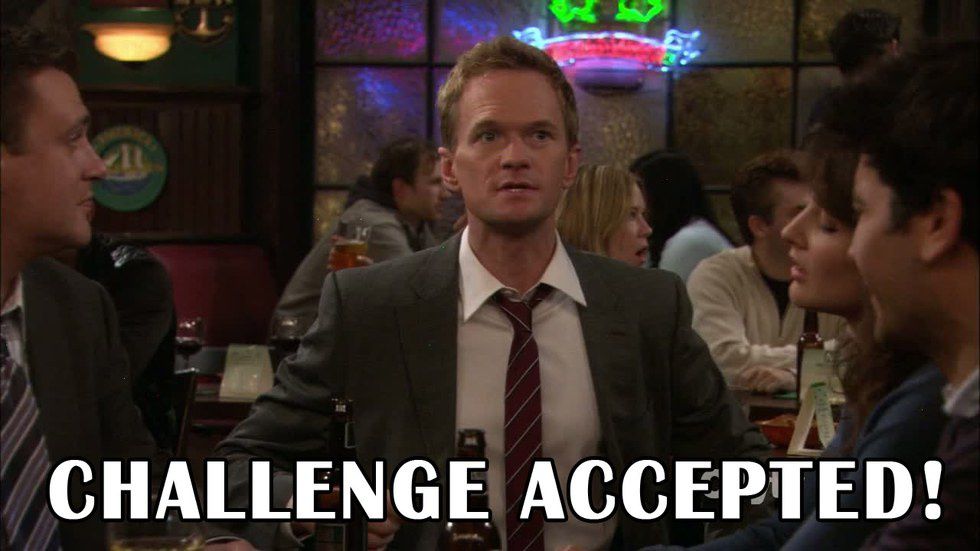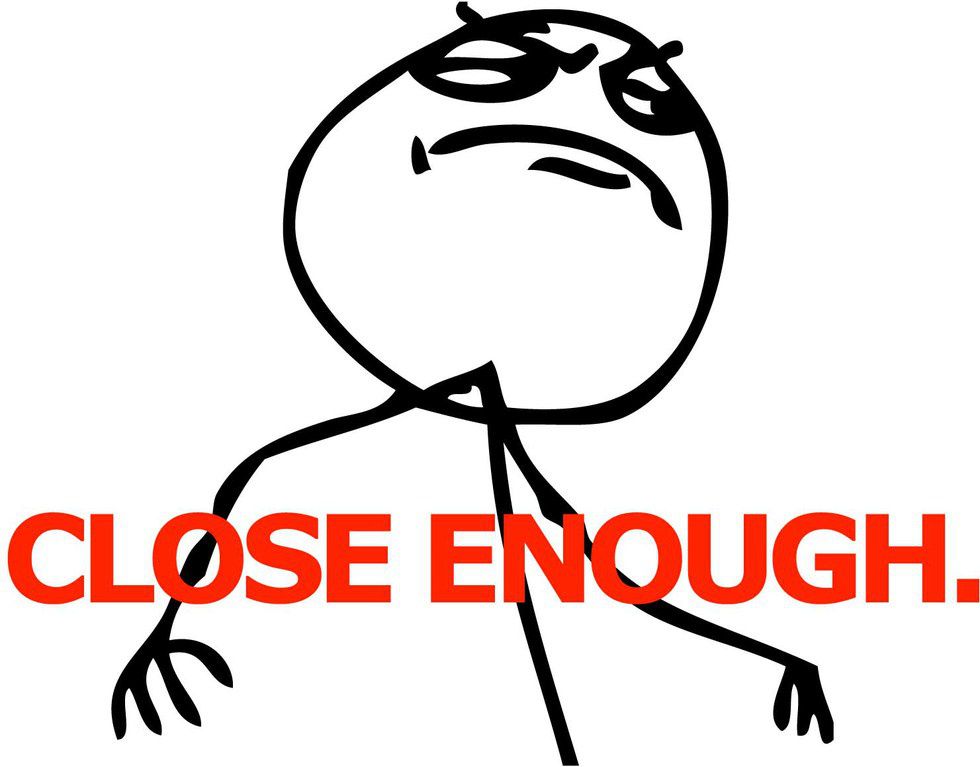Twenty pairs of youthful, five-year-old eyes gazed at her expectantly, each of them filled with mystical, innate curiosity. The students' gorgeous, sparkling eyes were a trait that all children inherently possessed by nature, and they were among the few things that still gave Ms. Bisset hope in the human race. Normally, the sight of them softened her cynicism in the increasing lack of humanity in an ever-changing world.
Today, Mrs. Bisset paced impatiently around her classroom, looking everywhere but at her precious students, and grasped onto the fact that the clock hand was positioned at five minutes to one. Her mouth suddenly tasted of acid again, though she had scrubbed the taste violently away with her toothbrush shortly after retching not too long ago. Her heart dropped towards her knees. She suddenly could not find the strength to remain upright and proper, as a teacher should, but found herself in a position of a small, sulky child as she desired nothing but to sink to her knees under her desk and wish this day away. But another glance at the clock told her that there was no time to be spared. She clenched and unclenched her hands, then took a deep breath. Looking straight at the clock, she announced to her class, "Children, it's time."
In her peripheral view, they got to their feet and shuffled obediently towards the door. Her students, her darling students, must have felt her dour mood. Without even a word, they had formed a line, notable for its lack of usual banter regarding whose turn it was to be line leader and whose turn it was to be the caboose and stomping feet.
They were thinking of my comfort, Ms. Bisset thought with immense fondness. It was more kindness than she could ask of most of her peers these days. She felt her heart swell with love, then immediately shrivel up into something dark and black. For the first time, she let herself think of the true tragedy that would commence in a few, short moments.
President Donaldson, who held the most prestigious title in all the land, had chosen this very school to give his annual Blockade Address. When she had learned of that roughly seven months ago, she had been faint with horror. That horror, on the eve of the address, had not diminished one bit. Instead, it was multiplied by some nameless number with multiple digits. In anticipation for this event, she had been struggling to fall asleep for the past fortnight and she had not been eating for a few days. She felt as if she would faint—it would come at no surprise to her if she actually did.
Principal Rodgers, however, shared a vastly different point of view.
"It is a great honor," Principal Rodgers had said with a smile so large it positively doubled the width of his face, "that the President in this marvelous country in which we lived accepted my invitation!" He had stared, awestruck and unseeing, at his audience of Northgate Elementary faculty and staff, as if he couldn't believe the words coming out of his mouth, either.
After she had gotten over her incredulity, she pondered the reason why President Donaldson would be interested in using Northgate Elementary as a venue for his highly publicized Blockade Address. Northgate was far from the president's painted ideal, and exactly the type of place he would eradicate if he could. It was a public school centered in the poorest part of an expansive city, in a site historically known to house immigrants fleeing oppressive governments, potato famines,and seek better futures. The walls of the school, then, was heavily graffitied with crude language and obscene pictures, and the front doors were even barred in the typical fashion of Northgate borough as to prevent breaking and entering and thievery. It was the very picture of troublesome school in dangerous community' that President Donaldson had planned to eradicate with his blockade of all illegal aliens. The Blockade Address was a national holiday made to commemorate the travel ban placed on every nation in the world. Ms. Bisset never figured out why Donaldson desired to have his address given here, of all places.
But then, shortly after, the federal government began sending Northgate large grants with explicit instructions. The school was to use the money to renovate itself into something that would fit into the picture-perfect upper-middle-class suburban ideal. With the school reeking of wet paint, she finally put the pieces together in her head.
Bringing the celebration here was a deftly calculated move on behalf of President Donaldson. He would act as if this shining, new school located rather unfortunately in one of the most notorious boroughs in the nation was the result of his Blockade policies, as if the country's poverty and crime was suddenly solved by the barring of 'illegal aliens' from even going on vacation within the nation's borders and worth the tanking of the tourism industry. Ms. Bisset was never one for speeches, but she had a clear idea for what this year's speech would sound like.
The cameras and the reporters would never get the full story, with President Donaldson's eradication of the First Amendment. They would only hear his marvelous speech and see what he wanted to see. The media would play their parts obediently, like a show following a script, and the public would be subject to the only truth he would allow them to see.
The thought of that was not only sickening, but it revved Ms. Bisset in all her nostalgia in the way that things had once been in this nation.
Ms. Bisset was not old by any means. She had begun teaching at Northgate two years ago, just after she had gotten her master's degree, pinning her in her late twenties. But even so, she was old enough to remember the country before President Donaldson had corrupted it. She remembered life before Blockade Day, life before President Donaldson was even elected. She remembered the days of social tolerance, back in those jubilant days where any two adults could get married in the eyes of the law, when every kind of person, regardless of race, gender or size was celebrated on the front covers of glossy magazines. She remembered the physical embodiment of freedom in the form of a massive green lady of French origin called Liberty. But mostly, she remembered back when her country was the envy of the world; the apple of everyone's eye in the good old days before Donaldson.
She could not look into the shimmering curiosity and the open-armed ways her beloved students viewed the world today. She feared that if she did, she would spend the rest of her life mourning the loss of childish innocence bestowed onto these precious younglings by nature. While today, with all its festivities and celebrations, would only remind her of all that was wrong with her country since the reign of Donaldson, today would also be the biggest day of the lives of the 20 children standing excitedly behind her in a crooked line.
Today would mark the day they saw Donaldson give his impassioned speech. Even if her pupils couldn't possibly understand the politics of today, they would still be subject to glamour and charms. Today, she could foresee, would be the beginning of the end of their innocence. Today, they would be lead to a path that taught them to fear and hate the very stuff of their flesh. Today, their rose-tinted glasses would be shattered with talk of illegal immigrants beyond the border that looked and talked like them but were inherently worse than them, due to their place of birth. Today, they would be taught that certain humans are not human at all, but illegal aliens. And for the sake of her, she did not want to come back from the assembly and see the dark seed of hate planted into their youthful eyes, so that they no longer marveled in wonder at the world around them but looked on cynically at those who did not fit their narrow standards. She refused to see this transformation.
And so, she continued to gaze high above their heads at the clock, watching as the seconds ticked past, bringing her closer to an assembly that she dreaded the thought of.
Time ran out. The clock struck one and somebody rapped on her door twice, then three times. This was the predetermined signal that it was time for her to go, as using the intercom would disrupt the filming of what seemed to be every news agency in the country. She opened the door a crack.
Reporters cluttered the halls, their chattering voices filling the heavy air and wires at their feet. She fretted, for a second, at the sheer volume of them, at how the wires and the bustling people would make a treacherous path for her kindergarteners to wade through. Concerned, she voiced aloud, "Children, there are lots of wires on the floor, and lots of people in the area. Be careful, walk slowly and don't trip."
Suddenly petrified for their sakes in a matter much more serious than tripping on live television, she felt a wave of motherly concern wash through her. She needed to see that they were okay. She supposed, briefly, that they would never be ready for the sort of journey they were to embark on today, and the consequences that would linger with them for the rest of their lives. But it was happening now, and it suddenly hit her of how dreadfully she'd regret cherishing their last moments of untainted innocence.
She needed to see their eyes one last time in all their shimmering innocence, riddled with curiosity, and completely open to the ways of the world. For the first time all day, she looked deep into each and every one of their eyes and seared their very essences into her heart.
Eyes never leaving theirs, she nudged the crack in the door wider.
"It's time, my loves."
Disclaimer: This is a work of fiction. Names, characters, businesses, places, events and incidents are either the products of the author's imagination or used in a fictitious manner.


















